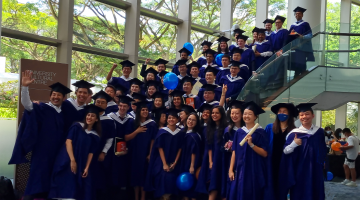Moving abroad for an MBA
Thinking of moving abroad for an MBA? Having moved from Indonesia, Safira Ardelia Djati (Class of 2022) shares how an MBA can help you settle in and offers some advice on the things one should consider when embarking on this new journey.
The challenges and difficulties of moving to a new country
Moving to a new country to study is a fantastic experience, but it certainly comes with its difficulties. Breaking into a social circle can be hard enough, so when it comes to discovering how and where to look for a job, it can be a slow, frustrating process.
Indeed, industries themselves can be hard to break into without the right contacts or qualifications. Speaking from her own personal experience, Safira shares that “the private equity sector is a very closed industry, so usually people will hire new employees based on referrals.”
Making contacts (and friends!)
Completing a course in a different country can help to open doors that would otherwise be inaccessible. People moving abroad for an MBA unlock a network of like-minded people, as well as tap into companies through internships.
For example, the full-time NUS MBA programme usually welcomes around 24 different nationalities representing all the major continents. Of the 120 or so students in every cohort, there are profiles from 25 separate industries. This means you not only absorb the experience of others in your class, but you can gather valuable contacts to help you transition into the working world.
Safira highlights the diversity of people involved in group work in particular: “If we have five to seven people, each student will come from a different sector or different industries, so that’s the way they try to mix it up and they try to push us to connect with each other.”
The benefits of experiential learning
The NUS MBA curriculum speaks for itself – with a dual-core foundation (academic and experiential), students learn general knowledge and concepts and put them into practice. With a broad understanding under their belt, students can then select electives from a mix of more than 50 experiential and academic electives, such as Analytics and Operations, Consulting, Digital Business, Finance, Innovation & Entrepreneurship, Marketing and more!
With these forward-thinking options, the NUS MBA shows that moving abroad for an MBA can open up doors that would not be as easy to access without the right qualifications.
However, experiential learning is not just about what you learn, but about how you learn. For example, Safira points to her improved presentation skills as a result of experiential learning. She explains, “I tried to sharpen my public speaking skills in English, business conversations in English. So the experiential learning modules have helped me a lot in trying to hone my interpersonal skills.”
Learn what it’s like to work in an international setting
The NUS MBA offers a globally relevant curriculum, as well as many opportunities for you to extend your international exposure. NUS MBA students can take advantage of international exchanges, study trips, case competitions, and internships to broaden their possibilities.
While each business school provides its own advantages, the NUS MBA prides itself on blending Western business models with an Asian perspective. In the face of an increasingly interconnected job market, and against a backdrop of surging economies in Asia, studying abroad helps you equip yourself with the knowledge and skills that go far beyond the curriculum.
Moving abroad for an MBA helps to make synergies between countries and cultures second nature for graduates. Students learn to respect the customs of the country they’re studying in without losing their own personal spark.
“If we don’t come out of our comfort zone and if we just communicate with the people in the same region or who came from the same nationalities and same culture, we won’t grow.”
Gain confidence in your new country
When starting a life in a new country, a lack of confidence can be a barrier to many opportunities. However, an MBA puts you on a level playing field where you can express your opinions and learn to manage your environment in a safe setting.
With a diverse cohort, students expect to hear diverse opinions and are receptive to them. Safira learned that “it’s okay to have different opinions…it doesn’t mean that when you speak English and it’s not perfect that you don’t have a point.”
Building your confidence in the classroom can be transferred into the wider world as you adapt to your new country.
Career options with an MBA
Ultimately, the main aim of an MBA is to boost your career. This is considerably harder if you’re not familiar with the job market of your adopted country. However, with an MBA, you can seriously increase your prospects.
At NUS, “Each student is assigned one career advisor from the career office…to ask anything about the job we want to explore, the sector, even to connect us with industry professionals,” Safira shares.
That first foot in the door is obviously great for getting your first job, but even better as a springboard to developing a local professional network. Safira adds, “I was connected to some founders and managing directors of the firms in Singapore.”
As someone who has already gone through the experience of moving abroad for an MBA, Safira is perfectly placed to offer advice to those thinking of doing the same.
“Be brave and open-minded because the purpose of going through an MBA is to come out of your comfort zone.”
This article is an adapted version of the original article, “Thinking about moving abroad for an MBA? Here are a few things to consider” by MBAGRADSCHOOLS.


